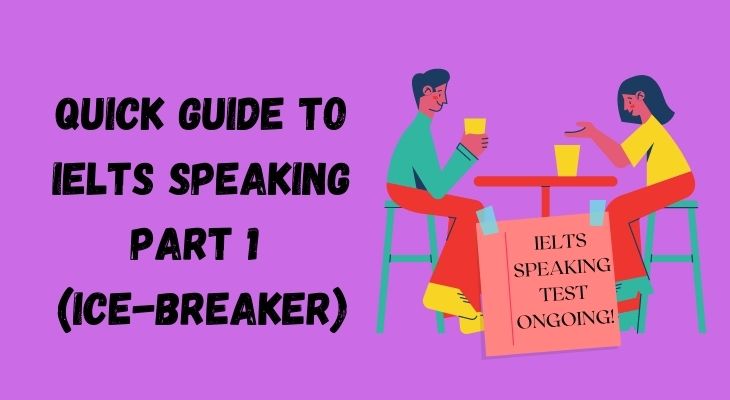Now we’re taking things a step further with a part-by-part breakdown of the different parts of the test – to help you to earn the best possible band-score!
So, let’s get started!
In our last blog, we gave you our Top Tips for IELTS Speaking
About IELTS Speaking Part 1
The first section of the test is in the form of an interview. The examiner will ask you 12 questions based on 3 topics. This conversation will go on for about 4-5 minutes.
This part of the test is all about you. You will be asked questions about yourself, your life and your country.
Is Part 1 the most important part of the IELTS Speaking Test?
You need to do well in all 3 parts of the Speaking Test in order to get a good score.
If you do well in Part 1, but not so well in Parts 2 and 3, this may result in a low score.
If you do not do well in Part 1 i.e. if you don’t speak enough, or if your language is incorrect, then your examiner may not get a good impression, which would affect your overall score.
It is important to prepare well for all 3 parts of the test!
Top tips for High Scores in IELTS Speaking Part 1
We gave you a number of tips in our last blog. These are a few more that will help you ace Part 1 of the Speaking test.
How much should I speak?
The point of the speaking test is to show the examiner that you have a good grasp over English. The more you speak, the more the examiner will see how well you can speak English.
Do not stop speaking after only 1-2 lines: Aim to speak at least 4-5 lines about a topic. Even if you feel like you’ve given the most basic, direct answer to the question, you can go beyond and talk about other closely related things.
Describe things in detail: especially when you are asked something about your life. This is your chance to really show the examiner how much English you know. For instance, if you are asked “What is your favourite room in your house?”, don’t just say “My favourite room is my bedroom.” Describe the room – is it big or small? Do you have a balcony or a window? Do you have a view? How have you decorated the room? What do you feel when you are in this room?
The examiner might stop you and move on to another question. When this happens, do not worry. It is a normal part of the test; it does not mean that you have spoken too much. Just listen to the next question and answer accordingly.
Should I speak fast or slow?
The main thing to remember is to speak naturally.
- Not too slow: do not drag your words and try to avoid long pauses.
- Not too fast: you may start talking too fast if you are nervous or if you feel like you need to show the examiner that you know a lot. Be calm, and maintain a steady pace of speaking. If you feel yourself getting breathless, it means that you are going too fast.
What if I don’t know an answer?
This test is not a test of knowledge. The questions you will be asked are related to your own life, so you shouldn’t have too much of a problem in this part of the test.
However, you might be asked something that doesn’t apply to your life. In this case, it is still possible to give an answer.
For instance, if you are asked, “What is your job?”, you can say “I am not working at present. I am enrolled in a Business program, and I am specialising in Finance, as this is the field that I would like to work in, in the future.”
The question did not apply to you, but in this way, you were able to show the examiner how much English you know.
Tips for preparing for IELTS Speaking Part 1
Should I memorise any answers?
The answer to this is a big NO. When you memorise answers, the examiner will realise this and you will lose points. You might speak a high level of English for one question for which you have memorised the answer… and then if the examiner suddenly switches to a different question/topic, you would start speaking a low level of English.
What you can do is prepare your ideas, especially for the most common topics (see below!) Keep a few interesting things in mind that you feel you would like to talk about… but do not try to memorise exactly what you will say.
How should I practice?
Another important thing you need to do is practice. Practice speaking on a number of different topics related to your life. Once you learn how to tackle different kinds of questions, you will be ready to answer any question in the test!
Ask a teacher, trainer or friend who is good at English to ask you questions based on common IELTS topics. As you answer them, try recording yourself. This will allow you to play it back to yourself and see how you sound. You will be able to identify where you need to improve.
Topics for IELTS Speaking Part 1
What are the most common IELTS topics and questions?
Everyone usually gets at least one of these topics in their interviews. We’re also listing a few sample questions. Remember, the questions will not always be exactly in this form.
About your Work
What is your job?
Where do you work?
Do you like your job?
If you had a choice, would you change your job?
Is it a popular job in your country?
Do you plan to continue with this job in the future?
About your Studies
What subject are you studying?
Why did you choose this subject?
What are some of the key aspects of this subject?
Is it a popular subject to study in your country?
Do you plan to get a job in the same field as this subject in the future?
About your Hometown
Where is your hometown?
Do you like your hometown?
What is there to see and do in your hometown, for a visitor?
What would you like to improve about your hometown?
Do you think your hometown is a good place to bring up children?
About your Home
Where do you live?
Who do you live with?
Do you live in a flat or in a house?
Which is your favourite room?
Do you plan to live there in future?
What is your neighbourhood like?
What are some of the other topics I might get?
The list is quite long, but these are the most common:
- About your life: Childhood, Birthdays, Family and Friends, Festivals, Pets etc.
- Daily aspects of life: using Computers, using Dictionaries, having a Daily Routine, having Leisure time, Exercise, Food, Clothing etc.
- Hobbies: Reading, Film & TV, Art, Music, Travel etc.
The questions will usually be related to:
- what you do – like whether you exercise or not
- what you believe – like whether you believe it is important to have a daily routine
- what you like/dislike/want to change – like whether you like reading, or what you dislike about using computers
- examples of these things from your life – like describing a recent trip, or a memory from your childhood
- how these things are in your country – like how people celebrate birthdays in your country
And that’s all for our Quick Guide to IELTS Speaking Part 1!
Did you find this information useful? Are you looking for a bit more help with the IELTS Speaking Test?
Then come to Hurray! We have plenty of hands-on practice and practical tips to help you ace the test in our IELTS Online training course. Reach out to us at info@hurrayedutech.com to learn more.
If you have any more questions about IELTS Speaking Part 1, feel free to post them in the comments below.











Post Comments